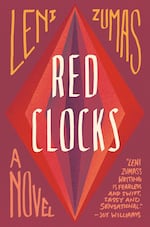
Leni Zumas is an associate professor in the MFA Program in Creative Writing at Portland State University.
Courtesy of Little, Brown and Company
Leni Zumas’ “Red Clocks” has shot up through the ranks since its January publication as a favorite read of 2018, with solid reviews coming in from the Washington Post, The New York Times, the Atlantic and others. A multi-layered narrative of four women, whose lives are brought together by circumstance in a small Oregon coastal town, the novel introduces readers to an America in which abortion is illegal and birth control a thing of the past. Those hoping to travel north to Canada to end a pregnancy meet with a newly built “Pink Wall,” arrest and extradition. Her characters, identified as archetypes like “The Biographer,” “The Wife,” “The Mender,” help Zumas excavate the social currents around motherhood and politics. We spoke with Zumas on a recent episode of "Think Out Loud," to hear about how the story took shape and what got her thinking about a dark future for reproductive rights.
Leni Zumas has several readings coming up:
Q&A with Leni Zumas
April Baer: How did these women materialize for you?
Leni Zumas: This whole book started as an essay attempt, not as a novel. In 2010, I was trying to write something about my own experiences trying to get pregnant and my own question about motherhood, ambition and creativity. I started writing in third person about this person that was going through what I was going through. It wasn't working as an essay. That character became The Biographer. She was soon joined by The Wife and The Mender. At that point all I had was this triangle of women who all had different relationships to their bodies, their careers and to each other. I like triangles and threes because they're very unstable and give way to rivalries and misunderstandings, especially among female friends! Then The Daughter and The Polar Explorer followed slightly later.

Leni Zumas' previous novel, "The Listeners," was a finalist for the Oregon Book Award.
Sophia Shalmiyev / Courtesy of Little, Brown, and Company
Baer: Why did you keep them somewhat anonymous at first?
Zumas: Part of it was the drafting process, giving myself ways to organize. But what I started to notice, when I labeled a section by a generic role rather than a name, something happened — a kind of undercurrent of questioning roles in general and labels and identity. For women, many of us are asked to choose a primary role that is more important than all the others, whether we're politicians or writers or radio hosts. Sometimes that primary role is supposed to be "mother." And I have a lot of questions about women who don't feel that way.
Baer: And in the America you imagine, every woman is defined by her reproductive values.
Zumas: Exactly. On a daily basis in our America, we see it, this idea that one's rights will be determined by what happens in one's uterus. It's really, really troubling.
Baer: You conceived of this right in the middle of Barack Obama’s tenure. Were there cultural frequencies you were hearing that maybe the rest of the country was not attuned to?
Zumas: Because I was doing research on fertility treatments for my own sake, I happened to stumble upon something I would not otherwise have come upon: the Personhood Amendment. Versions of this have been proposed by lots of lawmakers. As I understand it, the more grassroots conservative movement that calls for fetal personhood got really vocal around 2008. I started seeing Mike Pence's name a lot on my research, also Paul Ryan's name. It was an accident on my part but it really captured my imagination and my fear.
Baer: The small coastal town you dreamed up for this was a fabulous backdrop for so many things. It’s also a great place to talk about the solitude all four protagonists are fighting to reach. Why did that seem important to you?
Zumas: The setting first came from my own obsession and longing for coastal locations and the ocean and that sense of remoteness, coming up on the edge of human control and experience. Beyond that is the sublime. Originally it was not set in Oregon. When I first saw the Oregon coast in 2011 I couldn't believe how beautiful it was but also how dark it seemed to me, how dramatic. When I mixed that with the sense of being trapped in the comfort off a small community, everyone knows you — that can be very wonderful and very constricting. The ability to reinvent oneself or be more than one thing at once is not available to these women.
